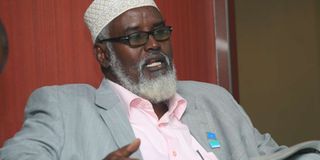Kenya, Somalia spat will hurt war on terror

The leader of Jubbaland Sheikh Ahmed Madobe during a past press conference in Nairobi.
What you need to know:
- The latest diplomatic tiff may be related to elections in Somalia.
- The entry of international actors into the maritime dispute has further complicated the matter. While USA and France favour Kenya’s position, Norway and UK support Somalia.
On Sunday, it was reported that Kenya and Somalia recalled their respective ambassadors from Mogadishu and Nairobi for consultations.
Somalia accused Kenya of interfering with its internal affairs, especially Nairobi’s hand in Jubbaland, one of the semi-autonomous federal states.
The Kenya Defence Forces (KDF) fought alongside Jubbaland to flush out Al-Shabaab in the region.
After the capture of Kismayu in 2012, Kenya’s next headache was to stabilise Jubbaland with a friendly leader. Indeed, Sheikh Ahmed Madobe or simply Madobe would shortly assert his authority in the state.
Somalia now accuses Kenya of pushing Madobe to renege on his earlier pledge about the election of MPs and subsequent election of president.
While this latest diplomatic tiff may be related to elections in Somalia, it is important to put this conflict in historical perspective for better understanding of the frosty diplomatic relations.
Albeit, the history of Kenya and Somalia portrays neighbouring countries with deep mistrust and suspicion, the past few years seem to have brought back the memories of the Shifta War of 1963-1967, when rebels with the support of Mogadishu attempted to claim the former North Eastern Province (NEP) with a dream of a Greater Somalia, a territorial expansionist dream that would have seen NEP in Kenya and Ogaden region in Ethiopia form part of the bigger state.
Kenya and Ethiopia resisted Somalia’s attempt in the Shifta and Ogaden war,1977-1978. While this dream was never realised, it is not lost on anyone that the Ethiopia-Somalia and Kenya-Somalia relations were adversely affected.
Maritime ruling
In February last year, Kenya asked the Somalia ambassador to depart for consultation in Mogadishu after Nairobi accused Mogadishu of attempting to auction off-shore oil and gas in a disputed maritime area.
Somalia had allegedly displayed a map of the disputed area to prospective bidders in a conference in London. This came after Somalia had filed a case in 2014 at the International Court of Justice (ICJ) at the Hague, seeking determination on the dispute.
Kenya’s attempt to challenge the admissibility of the ICJ to hear the matter failed and the case is set to proceed to full hearing.
The entry of international actors into the maritime dispute has further complicated the matter. While USA and France favour Kenya’s position, Norway and UK support Somalia.
USA’s war on terrorism and France’s interest in the oil and gas sector may have pushed them to support Kenya. Norway and UK too, would have benefitted if the disputed area was found to be in Somalia.
Because international players are keen in promoting their interests, it is incumbent upon Somalia and Kenya to solve their maritime differences bilaterally so as to promote good neighbourliness.
While the maritime dispute ruling is yet to come, and its finding expected to be binding, any of these countries may choose to disregard it. This means that ultimately, Somalia and Kenya must find a way of mutually co-existing.
Although elections are important, they should not be used to escalate diplomatic tensions at a time that two countries should be working more closely.
On the other hand, Nairobi should be open to Somalia even as it seeks to ensure a peaceful Jubbaland, which is in her interest as it serves as a buffer zone from Al-Shabaab attacks targeting Kenya.
Nairobi must pursue its interests in Jubbaland without being perceived as undermining the federal government in Mogadishu.





